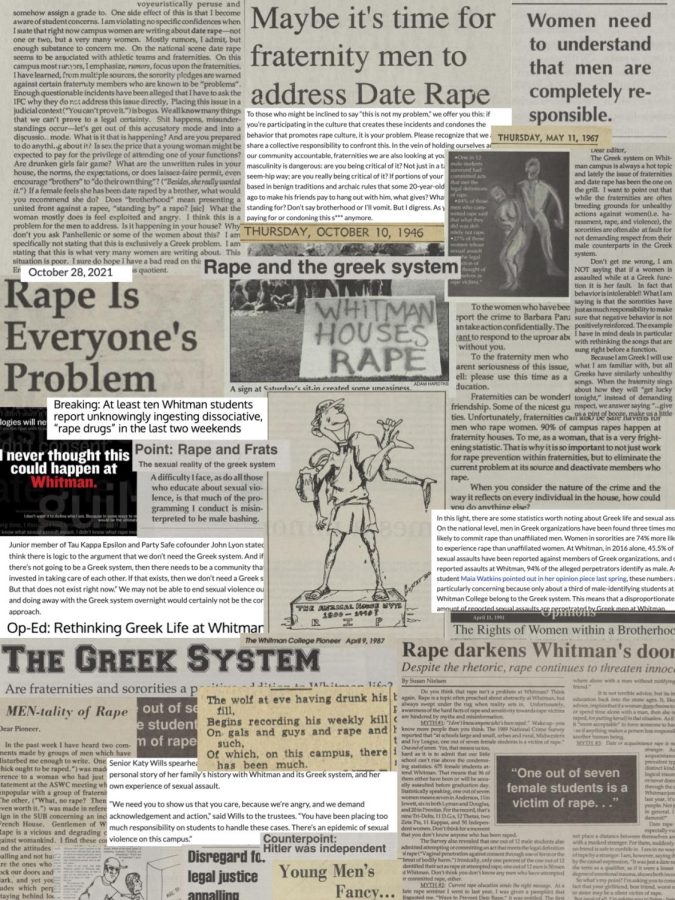The following is a guest op-ed from Baker Ferguson Chair of Politics and Leadership Timothy Kaufman-Osborn.
As part of the 2016 Power & Privilege Symposium, I participated in a workshop titled “Corporate Education: Need & Diversity at Whitman.” This title recalls what has now become a familiar refrain within our community: Higher education is falling prey to the pernicious forces of “corporatization.” As a result, so this charge goes, the purpose and practices proper to a liberal arts education are being supplanted by those that define capitalist business enterprises.
This workshop’s description cited “the suspension of the Global Studies Initiative” as a manifestation of “corporatization.” However much the College’s curtailment of support for this program merits criticism, I am not persuaded that this term provides much help in understanding why that is so. Indeed, to invoke “corporatization” in this context is to illustrate how this term now runs the risk of becoming an empty epithet that signifies little more than our unhappiness about any situation we find objectionable.
For another reason to be wary of unreflective invocations of this category, consider the recent spate of scholarly work that affirms “the corporate take-over of higher education.” Such language conjures up an image of businesses, often abetted by right-wing foundations, breaching the ivory tower in order to render the academy nothing more than an engine of national economic growth.
This representation is not without foundation. As governmental support, especially at the state level, has been withdrawn from higher education, public colleges and universities have turned to the private sector as an alternative source of revenue. This is perhaps most readily apparent in the emergence of various forms of “academic capitalism” that mock any effort to draw a tidy distinction between disinterested scholarly research and entrepreneurial profit-making. Moreover, there is good reason to be concerned about the growing number of college and university presidents who, drawn from industry and finance, import corporate managerial strategies into the academy. And, if truth be told, Whitman’s initiation of a strategic planning exercise reflects the transposition to higher education of a category that the business world adopted from the military in the 1960s.
To focus only on these manifestations of “corporatization,” however, is too convenient and arguably self-serving. True, this approach provides the satisfaction that comes from singling out an external villain we can righteously condemn. But this preoccupation deflects attention from the less obvious ways in which corporate rationality enters the everyday discourse of we who inhabit the academy.
It is within this context that I propose we situate the “Grit to Great” program recently initiated by the Academic Resource and the Student Engagement Centers. On the face of it, any effort to enhance the prospects for success on the part of Whitman students is to be commended. But to say that alone is to fail to inquire into the conception of success implicit within this initiative, the sort of subject it presupposes, and the form of education that best secures that subject’s formation.
As a psychological category, the concept of “grit” is chiefly associated with the University of Pennsylvania psychologist, Angela Duckworth. The website for the “Duckworth Lab” defines “grit” as “the tendency to sustain interest in and effort toward very long-term goals.” A corollary of grit, “self-control,” is described as “the voluntary regulation of behavioral, emotional, and attentional impulses in the presence of momentarily gratifying temptations or diversions.” Grit and self-control, then, are posited as personality traits that are more important than native talent (as measured, for example, by an IQ test) in determining achievement or lack thereof.
Crediting Duckworth’s “technical support,” in 2014, the World Bank announced preliminary results of its STEP Skills Measurement Program. These results were generated via the administration in ten “low and middle-income countries” of a survey designed to assess the presence or absence of “social-emotional skills,” including grit, that enhance the likelihood of “positive labor market outcomes.”
Fulfillment of these outcomes requires, among other things, the avoidance of “skill mismatches between workers and jobs.” Mismatches occur when prevailing cultural norms run counter to the specific form of work ethic that is required by a twenty-first global economy. Within that economy, for example, workers must acquire the capacity for self-discipline. But this capacity must prove congruent with the need to adapt frequently to the technological innovations that are essential to expanding economic productivity.
Hence, what contemporary capitalism requires is not mastery of specific forms of expertise, but, rather, acquisition of the “soft skills” that render the bearers of human capital receptive to continual re-training. Cultivation of these skills is in turn one of the principal tasks of any nation’s school system. And, in the service of this end, the World Bank calls for educational reforms aimed at inculcating the personality traits, including grit, that facilitate what it euphemistically labels “life-long learning.”
Especially since the 1970s, the political right in the United States has had great success in persuading us that those who fail have no one to blame but themselves. It is therefore unsurprising to find that the “grit narrative” has been adopted in many low-income school districts in the United States, especially those including large numbers of students of color. Often associated with the “no excuses” doctrine espoused by certain publicly-funded charter schools, more than one critic has argued that this narrative occludes the racism, poverty, and other systemic barriers that render a color-blind appeal to grit problematic at best.
Specifically, this story perpetuates the meritocratic myth which holds that anyone, with sufficient pluck and determination, can rise up the ladder of economic mobility. What that myth ignores, of course, is the considerable body of research indicating that educational achievement is far better correlated with the privileges of birth than with “self-discipline.” To refuse to acknowledge this evidence, to tell a structurally-disadvantaged student that failure is a consequence of not trying hard enough, is simply cruel.
Of course, at Whitman, we want to encourage students to acquire the virtue of self-discipline, to risk failure, and to persist even when knocked down. And, of course, we should not criticize students who, with good reason, are concerned about their post-Whitman occupational prospects, especially given the burden of debt most will carry for years to come. But that should not prevent us from recognizing the paradoxical situation in which we find ourselves today: Whitman College has indeed been “corporatized” insofar as it is now difficult to know how to justify a liberal arts education except as a means to the ends of career and income. Every time we offer that justification, however, we render a bit more hollow our belief that the unexamined life is not worth living.









